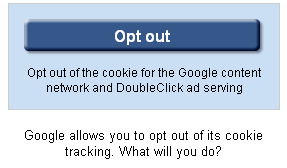Google doubles its cookie tracking: Will you opt out?

Google on Thursday rolled out improvements to its ad network and will add DoubleClick tracking across its sites. Google also made it easy to opt out of its double dose of cookies with one click. The larger question is whether users will choose to go cookie free.
Among the key ad network changes as detailed on Google's blog:
- Advertisers will control the number of times a user sees ads;
- Advertisers have more reporting on frequency changes--who saw an ad and how many times they saw it;
- Conversion data to see if people clicked through to a site.

We are enabling this functionality by implementing a DoubleClick ad-serving cookie across the Google content network. Using the DoubleClick cookie means that DoubleClick advertisers and publishers don't have to make any changes on their websites as we continue our integration efforts and offer additional enhancements.
The good news is that Google makes it easy to opt out with one click. And then the pause comes as a user. Do you buy Google's pitch that more relevant advertising is more useful? Do you buy Google's argument that advertising can be good for you? Do you trust Google and its claim that it won't combine personal information with its cookie data without consent?
Every individual will have his or her own answer. I found myself perusing the privacy policy for Google. My decision right now is to hold off on the opting out. I'm a realist and know that cookies make the Web go around. Meanwhile, I'm being tracked by everyone anyway and seem to be fine. That said it's worth perusing the privacy policy Google has:
Key items:
Google is using DoubleClick's cookie information to enable frequency capping, click fraud, ad reports, research and data crunching and new services.
And then there's this tidbit:
The advertising cookie information described above is provided to advertisers and publishers who use our advertising services. In addition, Google or our advertising and publishing customers may use web beacons in conjunction with the DART cookie to collect information about your visit to the website and exposure to a particular advertisement.
Google then assures us that it won't combine DoubleClick cookie information with personal information without your consent. It also won't combine the cookie information with DoubleClick's ad partners without permission.
[poll id=90]